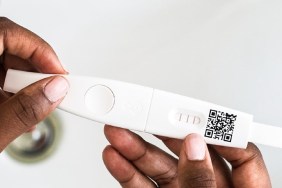If you’re trying to get pregnant, then you’re probably hyper-aware of every little change in your body following ovulation. Could that breast tenderness be an early pregnancy symptom? Was that crying jag due to PMS, or was it pregnancy hormones? While it’s hard to know so early on in the game, there is one common sign that could very well indicate you’re expecting: implantation bleeding. In fact, about a third of pregnant women will experience it, according to the American Pregnancy Association. So what is implantation bleeding exactly? Read on to learn more.
What is implantation bleeding?
Once an egg is fertilized, the embryo attaches itself to the lining of the uterus. Often, this implantation can break down blood vessels in the uterine wall, resulting in light bleeding.
When does implantation bleeding occur?
This light bleeding can happen about 10 days to 2 weeks following ovulation, according to the APA.
How long can implantation bleeding last?
Implantation bleeding can last anywhere from a few hours to a couple of days. If it’s your first pregnancy, you’ll likely bleed slightly more than you would in subsequent pregnancies because your uterus isn’t used to it.
What does implantation bleeding look like?
When you spot a little bit of blood, you might not be sure if it signals early pregnancy or an early flow. So how do you know if it’s implantation bleeding or your period? Well, implantation bleeding symptoms are slightly different. One of the first things to know is what color is implantation bleeding. According to the APA, it tends to be pink or brownish discharge, as opposed to bright red blood, and it’s free of any clots that often accompany your period. With implantation bleeding, you might also have light cramping, headaches, and mood swings.
Do you need to call your doctor?
As long as the bleeding is fairly light, there’s no need to call your ob-gyn. If you have heavy bleeding though, more so than a usual period, and it’s accompanied by fever, chills, or worsening cramps, definitely call your doctor as it could signal an ectopic pregnancy, according to WebMD.
If you believe you’re having implantation bleeding, you might be eager to take a pregnancy test, but wait until the week after you’ve actually missed your period for a more accurate result. A false negative is a major bummer.
Photo: Getty








